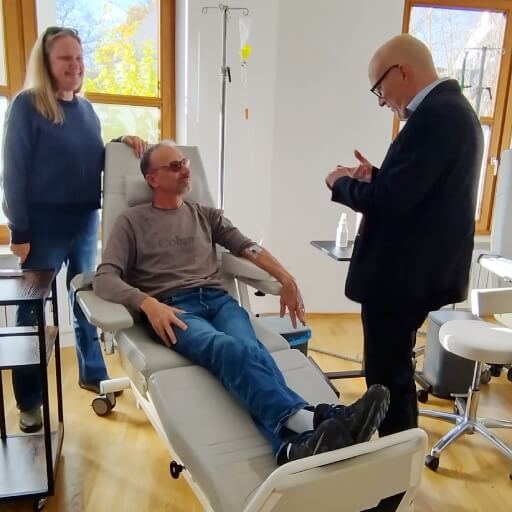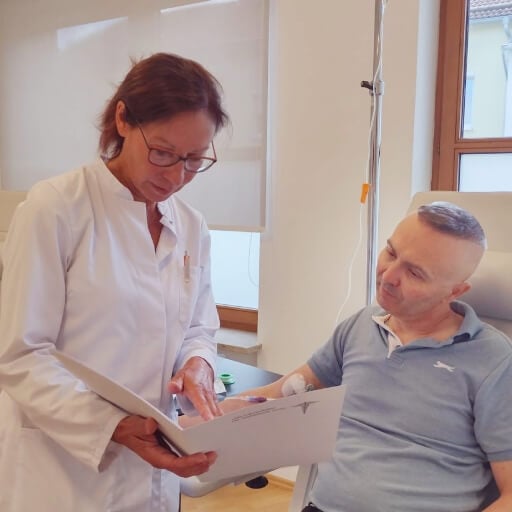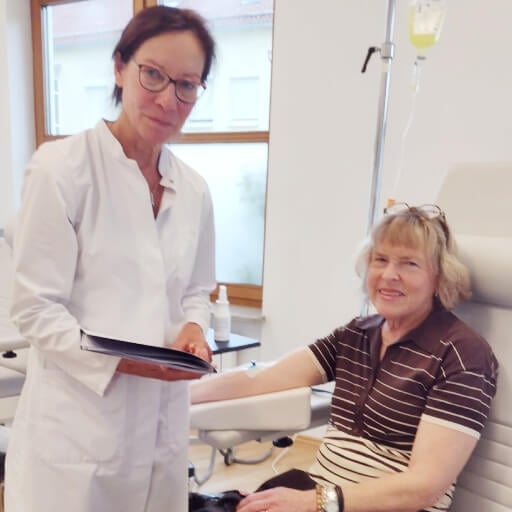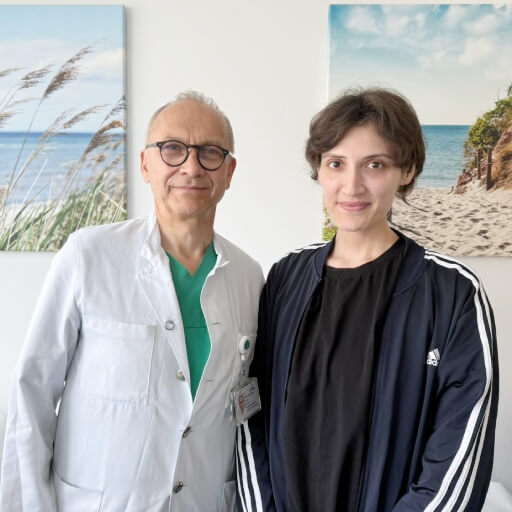The liver is the body's laboratory – it filters blood and performs hundreds of vital functions. Unfortunately, this makes it vulnerable to cancer cells: they travel through the bloodstream from the primary tumor and settle there, forming secondary liver cancer called hepatic metastases. According to the results of large-scale studies, colorectal cancer accounts for 21.4% of liver metastases, breast cancer – 4.4%, and lung cancer and skin cancer also contribute to these cases [3].
German medical centers offer treatment options that can control the disease and significantly improve the quality of life. We see encouraging outcomes in clinical trials. 1-year survival rates exceed 80% and 5-year rates exceed 30%, with advanced options. Thus, it is important to choose personalized treatment using the latest technologies – we will tell about them in the article.
Diagnosis of liver metastases
Suspected metastases in the liver require thorough examination. Diagnostic tests aim to:
- Detect secondary liver cancer
- Estimate the number of metastases
- Evaluate the location of hepatic metastasis relative to the blood vessels
Beyond all doubt, the primary tumor must also be detected. Cancer metastases in the liver should be diagnosed only in well-equipped clinics with the participation of experienced and highly qualified specialists. The most advanced imaging techniques are used here, including:
- Magnetic resonance imaging
- Multispiral computed tomography
- Positron emission tomography
- Angiography (that is contrast-enhanced X-ray)
- Fine-needle aspiration biopsy is carried out to detect the specific tumor type, when necessary.
Thermal Ablation Techniques for Liver Metastases
Such techniques are useful alternatives when surgical removal of liver metastases is not possible. They destroy cancer cells but keep healthy liver tissue using controlled temperature changes to target metastatic liver cancer with precision [4].
Hyperthermia for Liver Metastases
Hyperthermia is used as an auxiliary treatment – to enhance traditional cancer therapies. It is continuously refined by the German Society for Hyperthermia and the European Society for Hyperthermic Oncology (ESHO). The mechanism of action is based on cancer cells' being more sensitive to heat compared to healthy tissue.
The treatment involves heating affected liver areas to temperatures between 40-45°C. For this purpose, doctors use electromagnetic waves or infrared radiation – both are heat-generating. At elevated temperatures, several critical for tumors mechanisms occur:
- Enhanced drug penetration: hyperthermia boosts blood flow to metastatic sites, thus chemotherapy agents reach tumor cells more effectively
- Radiation sensitization: heat damages cancer cells' DNA repair mechanisms – and this makes previously radiation-resistant secondary liver cancer responsive to treatment
- Immune system activation: temperatures above 40°C trigger heat shock protein production – this helps the immune system work
- Direct cell death: at temperatures exceeding 42°C, programmed cell death (apoptosis) begins in cancer cells
For liver metastases treatment, hyperthermia can be combined with chemotherapy or radiation therapy. Adding this method to the scheme allows physicians to reduce drug dosages and maintain effectiveness.
Cryosurgery for Liver Metastases
Cryosurgery is good for patients with liver metastases from colorectal cancer, up to 5 cm in size for a separate focus. Mechanism of action: using extreme cold to destroy cancer cells. Depending on the clinical situation, this can be performed either during open surgery, laparoscopically, or percutaneously – under imaging guidance.
During the intervention a specialized probe delivers liquid nitrogen or argon gas to freeze secondary liver cancer to temperatures below -40°C – causing cancer cells to die while preserving surrounding healthy liver tissue. The procedure is particularly valuable for patients who are not candidates for traditional surgery:
- Multiple metastases, in both liver lobes
- High-risk medical conditions that make major surgery dangerous
- Strategic tumor locations near critical blood vessels or bile ducts
- Patient preference for less invasive treatment options
Smaller metastases (≤3 cm) and lower CEA levels typically yield better results. The procedure shows low recurrence rates at treated sites (6-15%); it can be safely repeated if new secondary liver cancer sites develop.
Radiofrequency and Microwave Ablation for Liver Metastases
Radiofrequency ablation (RFA) and microwave ablation (MWA) are thermal destruction techniques for liver metastases. Under ultrasound or CT guidance, physicians insert thin electrodes or probes into metastatic cancer tissue. These offer minimally invasive alternatives when surgery isn't possible or indicated. [5]
RFA generates controlled heat with high-frequency electrical current. The procedure typically takes 10-30 minutes per one site and can often be performed as an outpatient treatment. Patients experience minimal discomfort: they can usually return to normal activities within days rather than weeks required for major surgery.
MWA uses electromagnetic waves to create larger, more uniform heating zones with several key advantages:
- Faster treatment times with more predictable ablation zones
- Superior performance near blood vessels, where RFA may be limited
- Multiple lesion treatment capability – during a single procedure
- Particularly effective for liver tumours ≥3 cm in diameter
Both techniques are most effective for secondary liver cancer treatment with sites measuring 4-5 cm or less and can be safely repeated if new lesions develop.
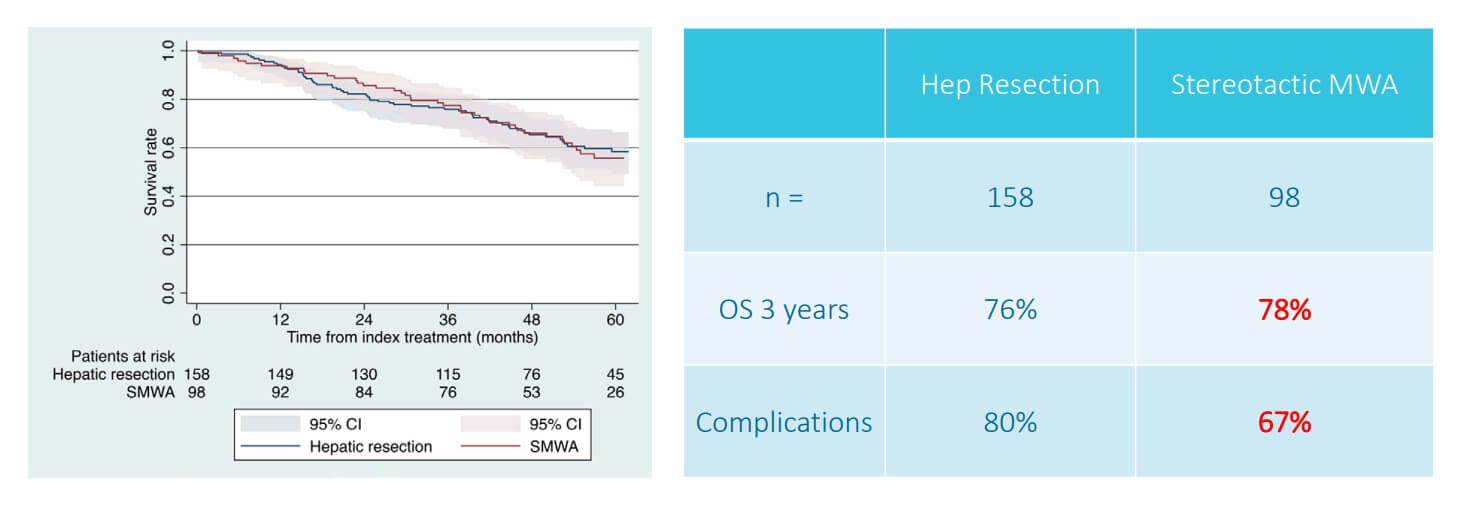
Chemical and Vascular Interventions for Liver Metastases
These targeted approaches work through the liver's unique blood supply system – either delivering concentrated medications directly to tumors or using chemical agents locally to destroy cancer cells.
Transarterial Chemoembolization for Liver Metastases
Minimally invasive transarterial chemoembolization (TACE) combines 2 mechanisms of action, i.e. targeted chemotherapy delivery and physical vascular occlusion. These lead to maximum effectiveness and minimize systemic side effects – which is important for cancer patients struggling with the disease for a long time [6].
Interventional radiologists use advanced imaging guidance and navigate a microcatheter through blood vessels directly to the hepatic artery that supplies the metastases with nutrients and oxygen. Chemo drugs are then injected into the tumor's vessels, delivering doses up to 15 times higher than possible with systemic chemotherapy. After that tiny embolic particles block blood vessels and thus keep the drug close to cancer cells, simultaneously starving them of nutrients.
Key advantages for liver metastases patients include:
- Targeted drug delivery with minimal systemic toxicity compared to traditional chemotherapy
- Outpatient procedure performed under local anesthesia with same-day discharge
- Repeatable treatment that can be safely performed multiple times as needed
- Preserved liver function by protecting healthy liver tissue during treatment
- Extended survival in cancer metastasis to liver
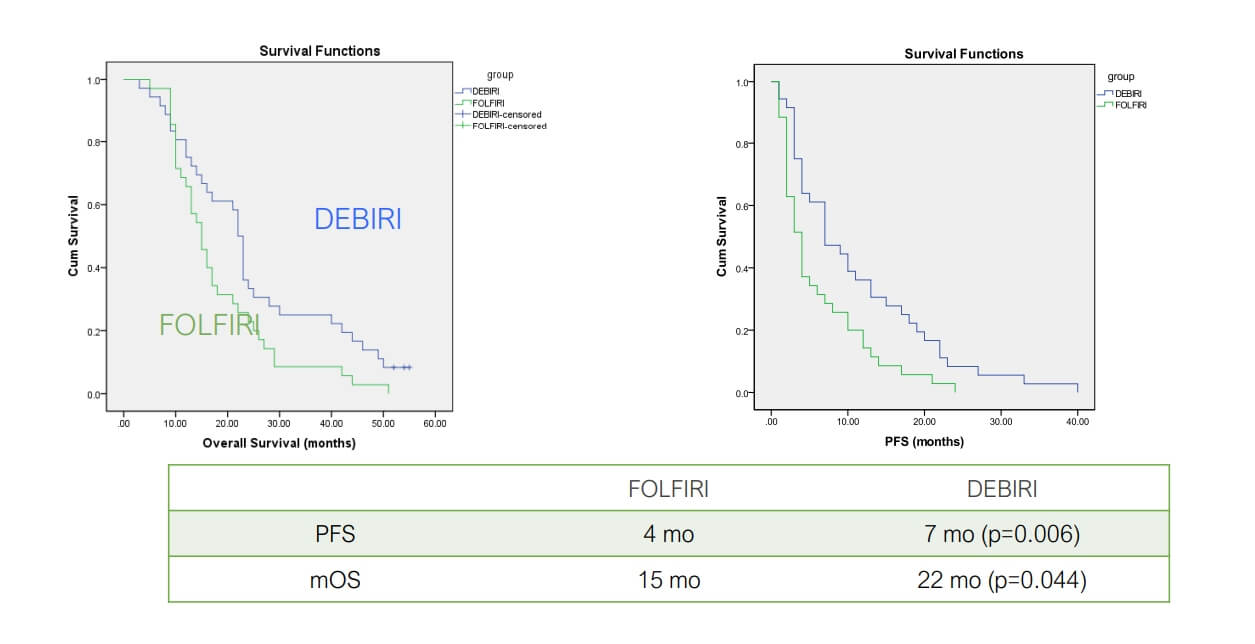
TACE has proven particularly effective for colorectal, breast, gastric, and lung cancer metastases, with response rates up to 80% depending on tumor characteristics. The procedure's effectiveness can be enhanced through a combination with systemic therapies.
Four-Time Around the World with Metastatic Cancer: Prof. Kovács on Real Patient Outcomes
Alcoholization of liver metastases
As a simple, cost-effective treatment, percutaneous alcohol injection (PAI) may be used for small liver metastases (under 4 cm). Under ultrasound guidance, physicians inject sterile ethyl alcohol directly into metastatic tissue; this causes immediate cell death through dehydration and protein coagulation.
The alcohol destroys tumor cells and triggers blood vessel thrombosis – a complete tissue necrosis followed by fibrotic scar formation is the result. As clinical studies show, complete tumor destruction is detected in over 50% of treated lesions, with particularly good results for colorectal, breast, and endocrine primary cancers that have spread to the liver.
Key benefits of this simple method include:
- Outpatient procedure, minimal invasiveness
- Low complication rates – mainly mild pain and occasional fever
- Repeatable treatment for metastatic liver cancer
- Cost-effective alternative when liver resection is contraindicated
PAI is a good option for patients who are unable to undergo surgery – due to medical conditions or tumor location. While newer thermal ablation techniques come to the forefront, alcohol injection remains a reasonable option for carefully selected patients with small, accessible liver metastases.
Radiation-Based Therapies for Liver Metastases
Non-conventional irradiation offers precise secondary liver cancer treatment options. Implanted radioactive sources and targeted microspheres – used in different approaches – destroy cancer cells with negligible exposure to healthy liver tissue.
Brachytherapy for Liver Metastases
Interstitial brachytherapy combines interventional radiology with radiation therapy to deliver high-dose radiation into the primary cancer and its spread to the liver. Under CT guidance, physicians place thin catheters into tumors and insert radioactive sources (an afterloading technique).
This minimally invasive procedure offers several advantages for liver metastases:
- Precise radiation delivery unaffected by breathing motion or blood vessel cooling effects
- Single-session treatment with high local control rates exceeding 80-90%
- Minimal healthy tissue damage
- Effective for various tumor types – including colorectal, breast, and pancreatic metastases
Studies show excellent local control rates with low complication rates under 4%. Brachytherapy is particularly valuable for metastases near critical structures – other treatments may be limited here.
Selective internal radiation therapy (SIRT) for Liver Metastases
With SIRT, radiation is delivered targetedly, with tiny radioactive microspheres – these are injected into the hepatic artery feeding cancer that has spread to the liver. Yttrium-90 spheres settle in tumor blood vessels and deliver concentrated radiation where it is aimed to work while sparing healthy liver tissue.
Key SIRT benefits are:
- Preferential tumor targeting with microspheres clustering around secondary cancer sites
- Minimal toxicity
- Excellent local control with impressive survival rates for colorectal metastases
- Outpatient procedure with quick recovery times
SIRT has shown particular effectiveness for colorectal liver metastases, offering months to years of progression-free survival with good quality of life. The treatment can be safely repeated and combined with other therapies. [8]
Targeted Remedies for Liver Metastases
Targeted therapies are the specialized ones – they focus on specific molecular pathways boosting cancer growth. These treatments work alongside the body's natural immunity to control secondary cancer sites with minimal harm to healthy tissues.
Targeted Therapy for Liver Metastases
The therapy uses several groups of medications that interfere with specific molecular processes – essential for cancer survival and growth. For primary cancer that has spread to the liver, angiogenesis inhibitors are a key treatment category. They block the formation of new blood vessels feeding tumors.
These drugs work by:
- Blocking the tumor blood supply – by preventing new vessel formation
- Starving secondary cancer sites of nutrients and oxygen
- Enhancing other treatments when combined with surgery or chemoembolization
Targeted therapy is typically administered by IV introduction. The approach offers patients extended disease control with manageable side effects (compared to traditional chemo) [9].
Dendritic cell vaccines for Liver Metastases
Dendritic cell vaccination, immunotherapy, is one of the most promising advances in metastatic liver cancer treatments. It is based on the Nobel Prize-winning discovery by Ralph Steinman in 2011, which speaks for itself [7]. Such vaccines make the body's own immune system awaken to target liver metastases.
Dendritic cells can be compared to the "generals" of the immune system. They identify cancer cells first and then train immune "soldiers" (T-lymphocytes) to recognize and destroy malignant tissue. The treatment involves extracting immune cells from the patient's blood, transforming them into trained dendritic cells in specialized laboratories, and reintroducing them – as a personalized vaccine.
The treatment offers remarkable benefits for cancer that has spread to the liver:
- Personalized medicine – tailored to a patient's specific cancer characteristics
- Minimal side effects
- Long-lasting immunity that provides lifelong protection against cancer recurrence
- Better quality of life preservation
As demonstrated by clinical evidence, clinicians see significant improvements in liver function, reduced tumor markers, and extended survival in patients with advanced cancer. The immune response is transformative – once activated, it develops lifelong memory against specific cancer cells; blood tests show dramatic increases in cancer-targeting lymphocytes. [10]
You can get more information from an exclusive interview with Prof. Dr. Frank Gansauge – a pioneer in dendritic cell therapy with over 22 years of experience treating cancer patients at specialized facilities in Germany.
Leading Immunotherapy Expert Prof. Frank Gansauge: "Revolutionizing Cancer Treatment with Dendritic Cell Therapy"
Specialized hospitals for Liver Metastases Treatment
Treating liver metastases is the most successful in multidisciplinary University Hospitals. Such medical institutions have the necessary equipment to carry out technically complex interventional procedures, use innovative types of radiation therapy, and novel approaches. Doctors from different departments cooperate closely – so the attending physician can quickly get advice from colleagues on any changes in the patient's condition.
Among the leading hospitals, we mention the following:
- University Hospital of Ludwig Maximilian University of Munich. The head physician of the Department of Gastroenterology and Hepatology – Professor Julia Mayerle – is a board member of the European Association of Gastroenterologists, Endoscopists, and Nutritionists (EAGEN). Here, physical removal of secondary cancer sites with a part of the liver (if necessary, a liver transplant from a healthy donor is performed afterward) is performed, as well as local destruction of the metastatic liver disease.
- University Hospital Düsseldorf. It is a host to the supra-regional center for the detection and treatment of chronic liver diseases and their complications – Department of Gastroenterology, Hepatology, and Infectology. High-tech procedures allow patients to get rid of cancer that has spread to the liver and maintain the normal function of the organ. Patients can also take part in clinical investigations of new treatment options.
- University Hospital Ulm. Comprehensive Cancer Center Ulm (CCCU) includes its Department of Gastroenterology and Hepatology. For outstanding success in treatment, the department received a certificate from the German Cancer Society (treatment of liver cancer). Here, procedures are carried out for treating liver metastases and the subsequent normalization of the gastrointestinal tract function.
- University Hospital Jena. Specializing in the treatment of gastrointestinal tumors and liver diseases, Department of Gastroenterology, Hepatology and Infectology offers minimally invasive procedures for tumor treatment, including argon plasma and laser coagulation therapy for bleeding or obstructive tumors, and mucosectomy for cancers. Under Prof. Dr. med. Andreas Stallmach's leadership, the facility conducts extensive clinical trials that provide patients with access to the latest cancer treatment options specifically adapted to individual cases.
- University Hospital Rechts der Isar Munich. Led by Prof. Dr. med. Roland Schmid, the Department of Gastroenterology, Hepatology, Endocrinology and Infectology provides comprehensive cancer care, with particular expertise in malignant diseases of the digestive system. The facility is well-equipped to manage complex cases – involving cancer that has spread to the liver and associated hepatic complications.
You can find a full list of hospitals and detailed information about treatment plans on the Booking Health website.
Arrangement of the treatment of liver metastases in Germany
Patients with primary liver cancer and secondary cancer sites in the liver, who receive quality treatment in the best German clinics, have a longer life expectancy. Booking Health can give expert advice on secondary liver cancer life expectancy and arrange your trip for treatment. We are experts in the field of medical tourism and clinical oncology.
The use of our services will ensure:
- Selection of the best clinic for the treatment of metastatic cancer and booking of the diagnostic and treatment program at the best price.
- Service package: assistance in obtaining a visa, booking a hotel located as close to the clinic as possible, booking airline tickets, translation of documents, and interpreter services during your communication with the medical staff of the healthcare facility.
- Saving up to 70% of the total costs of cancer treatment and its arrangement.
- Insurance to cover unforeseen medical expenses for up to 200,000 euros.
- Doctor’s follow-up consultation within three months after treatment program completion at no extra charge.
To use the Booking Health services, please leave a request on the website. We will call you as soon as possible.
Advanced Cancer Treatment: Patient Success Stories with Booking Health
Frequently Asked Questions About Liver Metastases Treatment
Send request for treatmentMalignant cell groups unnoticed by the anticancer immunity or having escaped its reaction that travel to liver and proliferate here are liver metastases. Protocols suggest surgery, ablation techniques, targeted radiation therapy, and advanced procedures (chemoembolization, DC vaccination) to be used in eligible patients, after the proper diagnostic tests.
Only under certain circumstances. Surgical removal is possible in the following cases: metastases are limited in number and favorably located. Also, healthy liver tissue must be enough for normal function after the surgical resection within the borders of healthy parenchyma. Those one with multiple lesions more often require alternative treatments.
Patients who aren’t candidates for surgery still have several options. These may include radiofrequency or microwave ablation, cryotherapy, TACE, radioembolization, brachytherapy, and several forms of immunotherapy – all are administered individually.
Leading German university hospitals – Ludwig Maximilian University Munich, University Hospital Düsseldorf, University Hospital Ulm, and University Hospital Jena – offer comprehensive liver metastases treatment. International patients can also undergo treatment here.
Treatment effectiveness varies by approach and patient factors. Ablation techniques often achieve strong short-term outcomes: with 1-year survival rates are above 80% and some patients reach 5-year survival rates of up to 65%. What is important for patients, combined schemes with newer immunotherapies demonstrate promising results and, moreover, improved quality of life and extended survival.
It is. Many treatments don’t rely on systemic chemotherapy at all. Surgery, various ablation methods, targeted radiation therapies, and immunotherapies – such as dendritic cell-based options – are frequently used alternatives. Some techniques deliver chemotherapy only to the tumor site, which helps avoid typical whole-body side effects.
Choose treatment abroad and you will for sure get the best results!
Authors:
This article was edited by medical experts, board-certified doctors Dr. Nadezhda Ivanisova, and Dr. Bohdan Mykhalniuk. For the treatment of the conditions referred to in the article, you must consult a doctor; the information in the article is not intended for self-medication!
Our editorial policy, which details our commitment to accuracy and transparency, is available here. Click this link to review our policies.
Sources:
[1] European Journal of Cancer. A prospective multicentre trial on survival after Microwave Ablation VErsus Resection for Resectable Colorectal liver metastases (MAVERRIC). https://www.ejcancer.com/article/S0959-8049(23)00175-2/pdf
[2] Journal of Vascular and Interventional Radiology (JVIR). Transarterial Chemoembolization with Irinotecan Beads in the Treatment of Colorectal Liver Metastases: Systematic Review. https://www.jvir.org/article/S1051-0443(13)01055-5/pdf
[3] Jennie Engstrand, Henrik Nilsson, Cecilia Strömberg et al. Colorectal cancer liver metastases – a population-based study on incidence, management and survival. BMC Cancer. 2018 Jan 15;18:78. doi: 10.1186/s12885-017-3925-x. [DOI] [PMC free article]
[4] Hideo Takahashi, Eren Berber. Role of thermal ablation in the management of colorectal liver metastasis. Hepatobiliary Surg Nutr. 2020 Feb;9(1):49-58. doi: 10.21037/hbsn.2019.06.08. [DOI] [PubMed]
[5] Francesco Izzo, Vincenza Granata, Roberto Grassi. Radiofrequency Ablation and Microwave Ablation in Liver Tumors: An Update. Oncologist. 2019 Oct;24(10):e990-e1005. doi: 10.1634/theoncologist.2018-0337. Epub 2019 Jun 19. [DOI] [PubMed]
[6] Cochrane. Transarterial embolisation, with or without chemotherapy, for liver metastases. https://www.cochrane.org/evidence/CD009498_transarterial-embolisation-or-without-chemotherapy-liver-metastases
[7] Roman Volchenkov, Florian Sprater, Petra Vogelsang, Silke Appel. The 2011 Nobel Prize in physiology or medicine. Scand J Immunol. 2012 Jan;75(1):1-4. doi: 10.1111/j.1365-3083.2011.02663.x. [DOI] [PubMed]
[8] Welsh JS, Kennedy AS, Thomadsen B. Selective Internal Radiation Therapy (SIRT) for liver metastases secondary to colorectal adenocarcinoma. Int J Radiat Oncol Biol Phys. 2006;66(2 Suppl):S62-73. doi: 10.1016/j.ijrobp.2005.09.011. [DOI]
[9] Frentzas S, Simoneau E, Bridgeman VL, et al. Vessel co-option mediates resistance to anti-angiogenic therapy in liver metastases. Nat Med. 2016 Nov;22(11):1294-1302. doi: 10.1038/nm.4197. [DOI]
[10] Rodriguez J, Castañón E, Perez-Gracia JL, et al. A randomized phase II clinical trial of dendritic cell vaccination following complete resection of colon cancer liver metastasis. J Immunother Cancer. 2018 Sep 29;6(1):96. doi: 10.1186/s40425-018-0405-z. [DOI]
Read:
New Effective Treatments for Stage 4 Cancer: Innovations in Oncology
Article menu:
- Diagnosis of liver metastases
- Thermal Ablation Techniques for Liver Metastases
- Chemical and Vascular Interventions for Liver Metastases
- Radiation-Based Therapies for Liver Metastases
- Targeted Remedies for Liver Metastases
- Specialized hospitals for Liver Metastases Treatment
- Arrangement of the treatment of liver metastases in Germany
- Frequently Asked Questions About Liver Metastases Treatment
Don't know where to start?
Contact Booking Health
